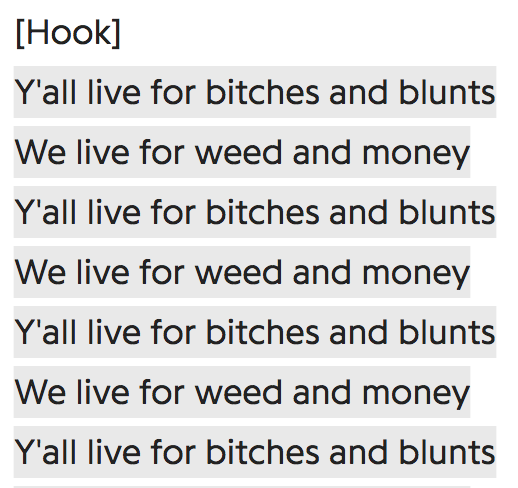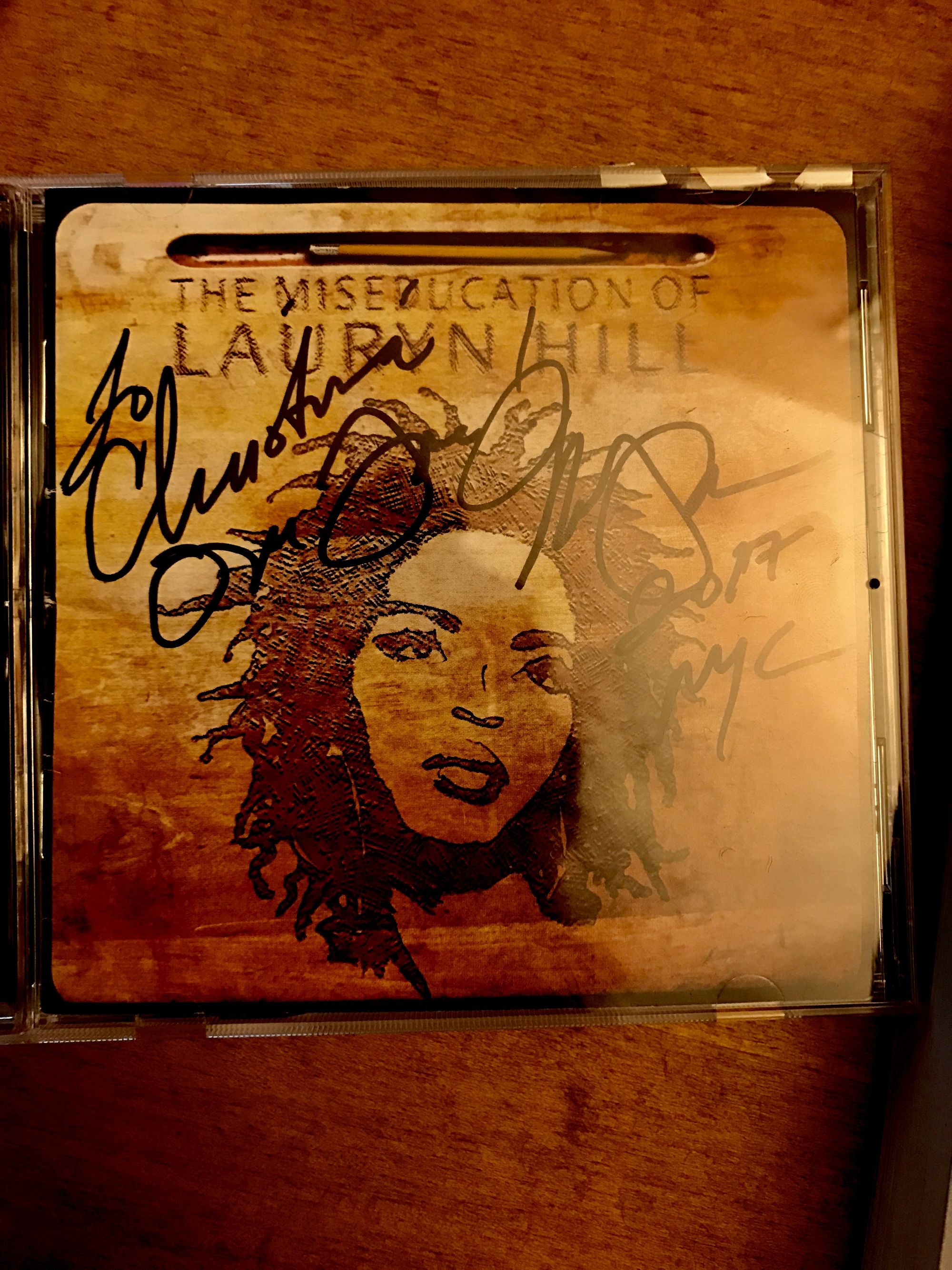A friend told me Jhené Aiko’s Trip sounded like falling in love. I listened to the album first in late January after second-hand suggestion — and in some ways, like trauma, I have never since not replayed it. The work is part-aria, part-monologue, part-diary. It addresses three figures through a contextual “you” — Aiko’s late brother Miyago, her daughter Namiko, and her boyfriend Big Sean. Lyrics stand simply with little word play. Boundaries between songs remain undefined. I have often explained my fascination with this album as a structural one, that songs cannot stand alone to encompass the further end of the album previously listed by Pitchfork, Variety, and Aiko herself: a map of love against, through, and within tragedy. But the experience of the album itself is not rigid. It expands symphonically. I once listened to Trip on a ride back from college on new car speakers. I sat in the back seat. We flew down the highway. Aiko repeats I’m on my way in the final song of the album. I felt at that point as if she sang beyond me.
There is an easy way to interpret Aiko’s most recent album. It is, after all, called Trip. It has a cover that demands a psychedelic interpretation. Linearly, the album follows the death of her brother. In the suggestively titled opening track “LSD”, Aiko states she is doing Everything I shouldn’t do / But those things bring me closer to you. But self-medication is not unique or even novel in urban music. In an NPR interview, former Wu-Tang manager Sophia Chang describes a conversation with journalist Joan Morgan during her own mourning of a good friend in the industry. “Soph, you never thought about the fact that all of these guys talk about how much weed they smoke and how much they drink?” Chang relates to her interlocutor Ali Shaheed Muhammed. In the interview, Muhammed responds that such self-medication is “the subject matter of what the art becomes,” that this glorification “entraps and keeps the perpetual lifestyle of oppression.” TDE’s Isaiah Rashad in The Sun’s Tirade raps in also suggestively-titled “AA” Let a n**** sip it all alone babe / It done been a long day, it done been a hard $10.30. Buzzfeed in an article “What Pill-Popping in Hip-Hop Means for Mental Health” denotes a shift from selling to using drugs as a point of pride. Future sings with bravado, without context, in “Hallucinating” Oh you did more percs than me? Then you must be hallucinating. 21 Savage has a song about lean called “Numb the Pain.”

But the discussion of self-medication — often ascribed to rappers and hip-hop — is gendered. To listen to mumble rap for too long, to run through the top ten hip-hop albums on Billboard, to fixate too intensely on a lyric, is often to ask what will we do with these broken men. I once watched a video by Genius about “unladylike” women in 2017, where the commercial success of women like Cardi B, Rihanna, and SZA was interpreted as an advancement from the restrictive gender roles that unraveled careers of previous singers like Mariah Carey and Brandy.
In this video, Aiko’s fixation on drugs was interpreted as a simple breakage from a ladylike mold. But Aiko’s fixation has, for me, a difficult name. It would be incorrect to label Tinashe’s similar professed love of drugs in singles like “2 On” and “Party Favors” as equivalent in nature to Aiko’s because it serves as nearly an addendum to Tinashe’s sex appeal, a way she serves, a plea to forget. When Rihanna states in “James Joint” from ANTI I’d rather be smoking weed the drug works as a world-builder — an inhale’s logical conclusion seems an exhale, perhaps into another person’s body. Aiko, however, seems as desperate about her drugs as Nas was when he stated Life’s a bitch and then you die; even more serious in perhaps the most iconic moment of the album, the interlude “Bad Trip,” where she wails, piercing and apocalyptic, I’m having an awful time / You said you would get me high. Each time I finish this album — which happened for some time this year once, twice a day — I am left asking, as I do with her male counterparts, what to do with this broken woman, who may or may not be a mirage?

I have often thought that Aiko is the only woman in the industry who could have produced an album filled so heavily with pain, who could self-describe as “violent,” without attention, shock, or accusation — because such descriptions seem so unbelievable masked under her pleasant voice, encased in her petite frame. Her image is ethereal. She worked in a vegan café; she quotes her horoscope. She claims she’s psychic; she’s a quarter Japanese. She seems trendy, harmlessly so.
But, contrary to Genius’s thesis, it is truly hard for me to say that her album is empowering precisely because it is coated in so much despair, even when it is calm. In “Jukai” Aiko stages a suicide attempt. The songs immediately after, scattered with love songs and features from Big Sean, is littered with themes like forever, nothing, and heartbreak. The words are placed with so much abandon they seem a desperate call for vivacity, a concept she almost consistently loses on her trips, on the both magnificent and devastating brink she approaches and revisits between life and death — a brink that is both because there, at the intersection, she is able to see her dead brother alive.
Her love is insecure. Her love never believes what it is. Hope you are who you say you are, she sings in “You are Here” over and over, in near meditation, before assuring herself, circularly, Taking it too far [is] gonna be hard /If you really aren’t who you say that you are. She launches into a trip. The song “Nobody” is so confessional (“the most introspective and personal song I’ve ever done” she said on an NPR interview), that its listenability rests almost entirely in the undramatic clarity of her voice — one watches as her life flashes in four moments: birth, childhood, the birth of Namiko, the death of Miyago. Namiko helps Aiko re-find meaning through her own love, starting “Sing to Me” with a sweet Wake up, Mommy, which begins the final iteration of the album, more optimistic but no less desperate.
In “Frequency”, she says the word bless sixteen times, alternating this plea between her situation and generation. In “Ascension” she delineates a path to heaven. The pain of life is love, Aiko states (There’s no loving without losing she sings in “Oblivion”), but the work’s structure also suggests that the solution to love is love (And we’re together how it was / How we were born to be in “Picture Perfect”), that also the problem of love is love (How I’m living, I don’t want no playback / From a past lover, bad lover in “You are Here”). Her work does offer a solution: to, simply, love; to recycle, reuse, and renew love, even love that is lost. “Trip” seems the most unwilling, difficult, obscured statement about love I have seen, challenged by longing, loss, and love itself.

Reading reviews on new R&B artists can often feel like watching an amateurish search for Dalai Lama in a hundred Tibetan boys, except instead of Dalai Lama the subject of emulation is Lauryn Hill, and instead of Tibetan children, this search rests exclusively with black American or British women. I cannot claim to be part of the generation that lived in celebration under Lauryn Hill’s reign. In 1998 I was one-years-old and in Missouri and yellow as a highlighter. But I grew up at the border of the lush green New Jersey town of South Orange that staged Lauryn Hill’s youth, watched her stretch in twenty-dollar ballet classes for teens and adults at my town before her youngest son Micah had a name, and lived for a good part of my high school life exclusively in the Miseducation. “For the thugs and the grandmas,” Hill once said when asked about her album’s label-less reception. Everyone, it seemed, had a piece, because Hill was prophetic, wise, young, in love, out of love, didactic, religious, and suburban. Who ever knew / the voo-doo you’d do she sang for the lovesick. After winter / must come spring she sang for the hopeless. I need you baby / to warm a lonely night she sang for the mothers. And me, before I became a woman and a decade too late, I considered myself Hill’s apprentice, aiming for a femininity as comprehensive, invulnerable, and gracious as hers. By graduation my father could list out her tracklist. Again? he’d ask. Yes, I’d say.
I often wonder if my generation is too voyeuristic for a Lauryn Hill. In which body today would a proselytizing twenty-something be acceptable? Would a persona (“a fictional character to please people” she once said about her public image) such as Hill’s last an interrogation by The Breakfast Club, a Twitter feud, a Kardashian comparison? Would Hill be able to achieve her status today without a grotesque chase for virality? Last June, SZA, sanctioned by Hill herself as an opener of the Miseducation anniversary tour, seemed to be the top contender for Hill’s replacement. Like Hill, SZA grew up in suburban New Jersey, sang on about romance and deceit and lessons, and had an immaculate fully-bodied voice.
But Ctrl was a different album than the Miseducation, and the distinction did not lay solely in packaging, as an article in Beat magazine suggested, stating that Ctrl “echo[ed]” themes of the Miseducation “for this generation.” SZA is never truly in love in Ctrl. She never admits a broken heart, never even an infatuation, and that is the central concern of Ctrl. Ctrl poses this question: what is the significance of relationships we accumulate that miss love? SZA’s answer seems that missed love approaches a distinct alienation — an alienation that punctuates the spirit with longing, which in the absence of love, makes life worth living. Why am I so easy to forget like that? she asks in “Supermodel.” In the most beautiful yet miserable moment of the album, “Garden”, she sings Hope you never find out who I really am / ’Cause you’ll never love me, / You’ll never love me, you’ll never love me / But I believe you when you say it like that, which is, maybe, the album’s thesis. That the album speaks so deeply to my generation of women — twenty-somethings, all alone, still not a thing in [our] name as SZA sings in “20 Something” — is a testament to the complexity of dating, the delicate self-esteems of women of color, the schizophrenic tug between femininity and modernity. But it is hard to say that SZA’s concern is one of love. In this way, Aiko’s Trip seems more thematically aligned with the Miseducation — but it is too distressed to appear as Hill’s modern equivalent.

I mark many differences between Hill and Aiko when I make this comparison. The least notable is age. Hill was twenty-three years old when the Miseducation came out; Aiko was twenty-nine. Hill has fallen in love in the public eye twice, once with bandmate Wyclef Jean, once with Rohan Marley, and has never married. Aiko seems never to stop falling in love; she released a joint album TWENTY88 with Big Sean in 2016, the same year she married and divorced Dot da Genius. It would be difficult to say if Hill’s vision of love stayed so constant in the last twenty years since the Miseducation’s release. In Trip, Aiko acts not as a prophet but victim, id, and skeptic. Though arduous, it is perhaps the most accessible message for a generation that yearns, before all, to peer.

Comments powered by Talkyard.